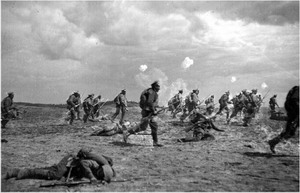
Battle in Stolovichy
 When the Commander of the Western Front A. Evert had failed in the battle near Lake Naroch, he became despondent. He was called for a meeting in the main office of the Stavka (The High Command of the Armed Forces) on 1 April, 1916. There A. Evert was charged to perform again the role of "battering ram" – to conduct an attack from Maladzechna towards Ashmyany and Vilna. The Northern Front was ordered to conduct an additional attack from Dvinsk towards Swieciany.
When the Commander of the Western Front A. Evert had failed in the battle near Lake Naroch, he became despondent. He was called for a meeting in the main office of the Stavka (The High Command of the Armed Forces) on 1 April, 1916. There A. Evert was charged to perform again the role of "battering ram" – to conduct an attack from Maladzechna towards Ashmyany and Vilna. The Northern Front was ordered to conduct an additional attack from Dvinsk towards Swieciany.
Evert possessed sufficient military power. However, the Commander of the Western Front could not conduct a military attack as he hadn’t overcome the fear emerged after the defeat in the battle near Naroch. Shortly before 18 May, he unexpectedly got in touch with the Stavka and asked for a delay giving reasons that combat engineer support wasn’t ready. On 27 May, the Stake allowed to postpone the offensive till 4 June, but on the condition that the left flank of the front had to liberate Pinsk and save strength for the further attack on Kobrin.
It’s hard to say why on this attack A. Evert has decided to send only one corps – Grenadiers under the command of Lieutenant-General D. Parsky. He must have tried to show by this deliberate failure that offensive missions should have taken place further south than that territory. The Grenadiers were going to throw their strength to Stolovichy – the village located in four kilometers east of Baranovichy (now this area is near the highway Moscow – Brest). The Russian 1st and 2nd Grenadier Divisions (26 thousand solders, 125 guns) confronted the 11th, 19th and 51st Landwehr Regiments of the 22nd Infantry Brigade of the 4th Landwehr Divisions (9 thousand solders, 60 guns). The both parties held fortified positions along the hilly banks of the River Schara. Advanced military powers of the enemy were located in 2 km from each other.
The battle near Stolovichy ended in complete failure. The Russian Grenadier Regiments came on the Belarusian land, but they didn’t crush the Germans’ heavily fortified line of defense. And the main thing was that the battle in Stolovichy alarmed the enemy and actually revealed Russians’ plans. Before 31 May the Germans had expected offensive operations of the Western Front on Ashmyany and Vilna (it was known from reports of military intelligence), but after that it was clear that Evert would conduct the main attack towards Baranovichy. It was much more dangerous for the Germans: if the attack on Ashmyany and Vilna inevitably led to the local operation, then if A. Evert’s decision to attack Baranovichy had been successful, it would have opened the way to the Russian Brest-Litovsk and Brusilov’s victorious troops helped the Western Front from the south.


